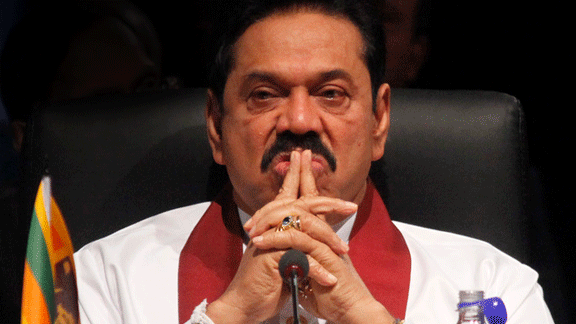Sri Lanka’s dirty secrets

Review: Sri Lanka’s secrets: how the Rajapaksa regime gets away with murder, by Trevor Grant. Monash University Publishing.
----------
“People were lying everywhere amongst the bricks and broken glass, some with huge wounds to their stomachs and chests, others with legs and arms severed. The top floor had 150 patients, mostly amputees. A lot of them dead.”
This is the eyewitness testimony of “Puyal”, a Tamil social worker. The broken glass and bodies are from a hospital in the “no fire zone” deliberately targeted by Sri Lankan fighter jets. It would be one of 65 reported attacks on medical facilities as the Sri Lankan military rained death during the final days of the civil war in 2009, killing up to 70,000 Tamil civilians. Tens of thousands remain missing.
This is only one of the distressing war crimes documented in Sri Lanka’s secrets: how the Rajapaksa regime gets away with murder, a hauntingly powerful book by journalist and activist Trevor Grant.
Grant refuses to use a dispassionate and detached tone when discussing genocidal violence. Sri Lanka’s secrets shakes with rage. And how could you respond otherwise to the pages and pages of testimony by Tamils of torture and rape:
“The room was small. There was blood, a lot of it fresh, on the floor. One officer told me to lick the floor clean.”
“They put the pipe in my anus … I couldn’t bear the pain ... It was torn and bleeding. I saw barbed wire on the bed. They had put it through the pipe … This went on for 10 months.”
These terrifying accounts are from depositions to Australian authorities as part of an asylum claim. But much of the testimony is from interviews with Grant.
His determination to give voice to survivors is part of the fight for justice, a point made in the book’s epigraph, which quotes Czech writer Milan Kundera: “The battle of man against power is the battle of remembering against forgetting.”
The Sri Lankan regime understands this. It attempted, unsuccessfully, to pressure Monash University Publishing to withdraw support for the book. The book’s photographer, who was subjected to brutal torture sessions following arrests between 2010 and 2012, was forced to flee the country.
These dates fall well outside the war’s official end. Grant makes it clear that despite “peace”, the war on the Tamils continues. Tens of thousands of soldiers occupy the Tamil north-east. Torture, rape and disappearances continue to be widespread.
Sri Lanka’s secrets also takes aim at world powers for their complicity, from China’s overt military and economic support for the regime as it pursues its “string of pearls” strategy, to the US’s covert encouragement of the regime to use cluster bombs. All averted their eyes because they supported the crushing of the Tamil Tigers. All prized regional stability and their own geopolitical and economic interests over the rights of an oppressed population to self-determination.
The Australian government’s “sweet embrace” of the Sri Lankan regime is a particular focus of the book. While a number of world leaders baulked at attending the CHOGM in Colombo, Abbott “constructively engaged” by justifying torture: “Sometimes in difficult circumstances difficult things happen.” For the Australian government, no cost is too high to “stop the boats” carrying Tamils fleeing state terror.
Importantly, Grant condemns the approach that equates the violence of the oppressor with the violence of the oppressed. He situates the rise of the Tamil Tigers in the history of disenfranchisement, humiliation and racist pogroms against Tamils: “More than two decades of non-violent protest counted for nothing … After twenty years of anti-Tamil pogroms, often aided and abetted by government military and police … the Tamil Tigers gained unstoppable impetus in their own community.”
The shocking truth contained within Sri Lanka’s secrets is not aimed to paralyse the reader with grief. Rather this book is a campaigner’s contribution to what will be a long struggle to end the impunity of despots and their enablers. It ends quietly confident: “There is always one thing that despots forget as they go about their business of murder and terror. You can kill thousands of people, but you can never kill the human spirit.”
[Sri Lanka’s secrets: how the Rajapaksa regime gets away with murder, by Trevor Grant with a foreword by Geoffrey Robertson QC. Available through Monash University Publishing.]